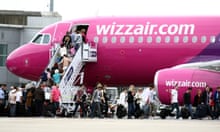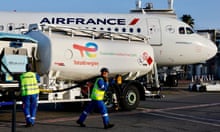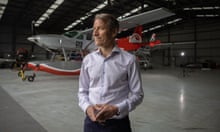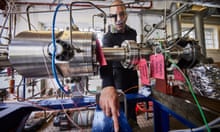Airline passengers face higher ticket prices as the industry moves towards its target of reducing emissions to net zero by 2050, the head of a global trade association has said.
Willie Walsh, the director general of the International Air Transport Association, which includes most of the world’s big airlines, called for swifter action in Europe to drive up scarce production of greener sustainable aviation fuel (SAF).
Air fares have jumped this year as a result of higher prices for conventional fossil-based jet fuel.
“You cannot expect an industry making on average $1 profit per customer to absorb the increases we’ve seen,” Walsh told reporters at an annual media briefing.
“Going forward as we see increases in carbon costs … there has to be an impact on ticket prices as the industry transitions to net zero. The airlines cannot absorb increased costs.”
Environmental groups argue that higher air travel costs will help to rein in emissions by curbing growth in traffic.
Walsh praised efforts by the US to lift output of clean fuels, in apparent contrast with European objections that new American incentives could create an uneven playing field.
“In the US it is recognised that sustainable aviation fuels are part of the answer and they are heavily focused on additional production,” Walsh said.
He dismissed as “nonsense” EU moves to oblige airports to offer increasing supplies of SAF, which is not widely available. “Europe’s answer to the problem penalises people,” he said.
Carriers in the UK have been scrambling to secure long-term supplies to meet a 2030 target to use 10% SAF in their fuel mix. Virgin Atlantic on Tuesday announced it had signed a deal via partner Delta for 70m tonnes of SAF, about 20% of their requirement, which will be delivered from the US.
Last week Ryanair announced a memorandum of understanding with Shell to build up SAF supplies around Europe, particularly at Dublin and London Stansted.
after newsletter promotion
In July, the European parliament backed rules on aviation fuel that set binding targets for the replacement of kerosene with less polluting sources, while extending the definition of what a green fuel could be.
In the US, the Biden administration has launched a government challenge to supply at least 3bn gallons (11.3bn litres) of SAF a year by 2030.
The airline sector is considered one of the most difficult to decarbonise as fuel for flights cannot be easily replaced with other kinds of power.
This year’s US Inflation Reduction Act includes significant subsidies to the SAF industry in the form of tax credits, but European industry leaders including the head of the aircraft maker Airbus have said the legislation is unfair.
Iata said at the same briefing that global airlines were expected to make combined profits of $4.7bn (£3.9bn) in 2023, in what would be the first industry-wide profit since 2019, before the Covid-19 pandemic.






